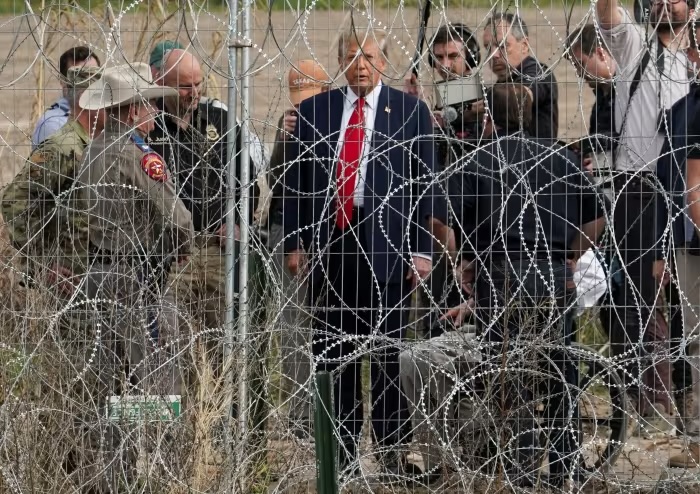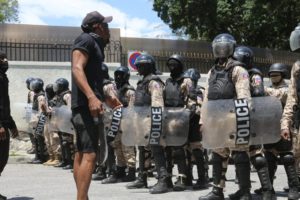The governments of the Bahamas and the Turks and Caicos Islands have unequivocally rejected a controversial proposal by the incoming Trump administration to use their countries as destinations for deported migrants. The plan, revealed in an NBC News report, involves sending migrants to third-party countries if their home nations refuse to accept them.
Firm Opposition from Caribbean Leaders
On Thursday, both governments issued strong statements against the proposal. Bahamas Prime Minister Philip Davis announced that his administration had “reviewed and firmly rejected” the plan, emphasizing that no further discussions with the Trump transition team had occurred since their rejection.
Similarly, the Turks and Caicos Islands, a British overseas territory, voiced their staunch opposition. Officials highlighted concerns over the potential social and economic strain such a plan could impose on their small nation, making it clear they would not participate in such an arrangement.
Trump’s Immigration Strategy Faces Criticism
The deportation plan is part of President-elect Donald Trump’s broader immigration strategy, which seeks to fulfill campaign promises of mass deportations. The NBC News report identified the Bahamas, Turks and Caicos, Panama, and Grenada as potential destinations for deported individuals. Critics argue that the plan risks permanently displacing migrants in countries where they have no cultural, linguistic, or familial connections.
Human rights organizations and immigration experts have condemned the proposal, warning that it could violate international law and exacerbate humanitarian crises. By sending migrants to unfamiliar countries without their consent, the plan raises serious ethical and legal questions.
Growing Resistance to Hardline Immigration Policies
The Bahamas and Turks and Caicos have firmly opposed becoming “dumping grounds” for deportees. Prime Minister Davis underscored that his government would not allow the country’s sovereignty to be undermined. Similarly, Turks and Caicos officials stated that they would not engage in any arrangement that placed an undue burden on their territory.
This resistance reflects a broader pushback against the Trump administration’s hardline immigration policies, which have been criticized for prioritizing political rhetoric over viable solutions.
Unanswered Questions
The Trump administration has not yet commented on the rejection by the Bahamas or the Turks and Caicos Islands. Questions remain about whether deported individuals would be granted legal work status in these countries and what measures the U.S. might take to pressure nations to comply with its plans.
What’s Next?
As the Trump administration prepares to take office, the proposed deportation strategy is expected to remain a contentious issue. With resistance mounting from the international community, the plan’s feasibility and legality will likely face significant scrutiny.
This story highlights the complex challenges surrounding global migration policies and the importance of collaborative, humane approaches to address these issues.
Stay tuned for updates on this developing story.
Source: NBC News and Miami Herald
Share this:
- Click to share on Pinterest (Opens in new window)
- Click to share on Twitter (Opens in new window)
- Click to share on Facebook (Opens in new window)
- Click to share on WhatsApp (Opens in new window)
- Click to email a link to a friend (Opens in new window)
- Click to share on LinkedIn (Opens in new window)
- Click to share on Tumblr (Opens in new window)
- Click to share on Reddit (Opens in new window)
- Click to print (Opens in new window)






























![Bring the Caribbean to your kitchen.
Discover bold, time‑saving flavor with Épis of Haiti spice blends—perfect for authentic island dishes or a vibrant twist on your favorites. Taste tradition, transform your cooking. [ @episofhaiti ]
Explore the full collection at episofhaiti.com
#AD #lunionsuite #haitianamerican #episofhaiti](https://scontent-lga3-2.cdninstagram.com/v/t51.75761-15/491432320_18506758480023307_6411904492707133407_n.jpg?stp=dst-jpg_e35_tt6&_nc_cat=109&ccb=1-7&_nc_sid=18de74&_nc_ohc=mg9gOnjwWSMQ7kNvwHmwuoi&_nc_oc=AdnLNy2-7vf5do1dbVcTviEujqlBywo5qZEsDvrjqIUKPK8B30RjrhBkQIPsoMb2IJc&_nc_zt=23&_nc_ht=scontent-lga3-2.cdninstagram.com&edm=AM6HXa8EAAAA&_nc_gid=f7-FJBfTicFMgvzbOvz5Qg&oh=00_AfGk47_m1myFzsOzmv_Hlof5rA4eOEW5YFp9FrTQLd4rTg&oe=6811FC11)
